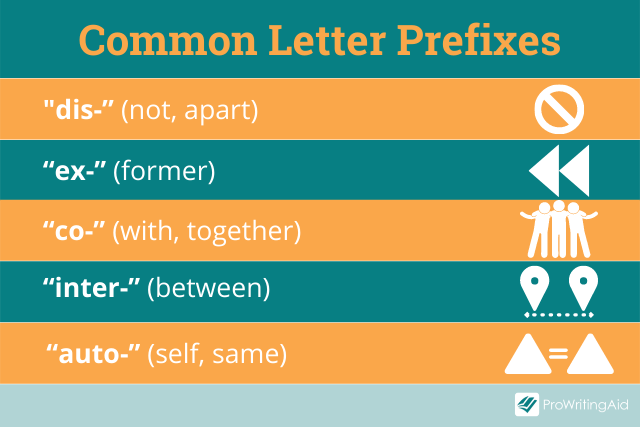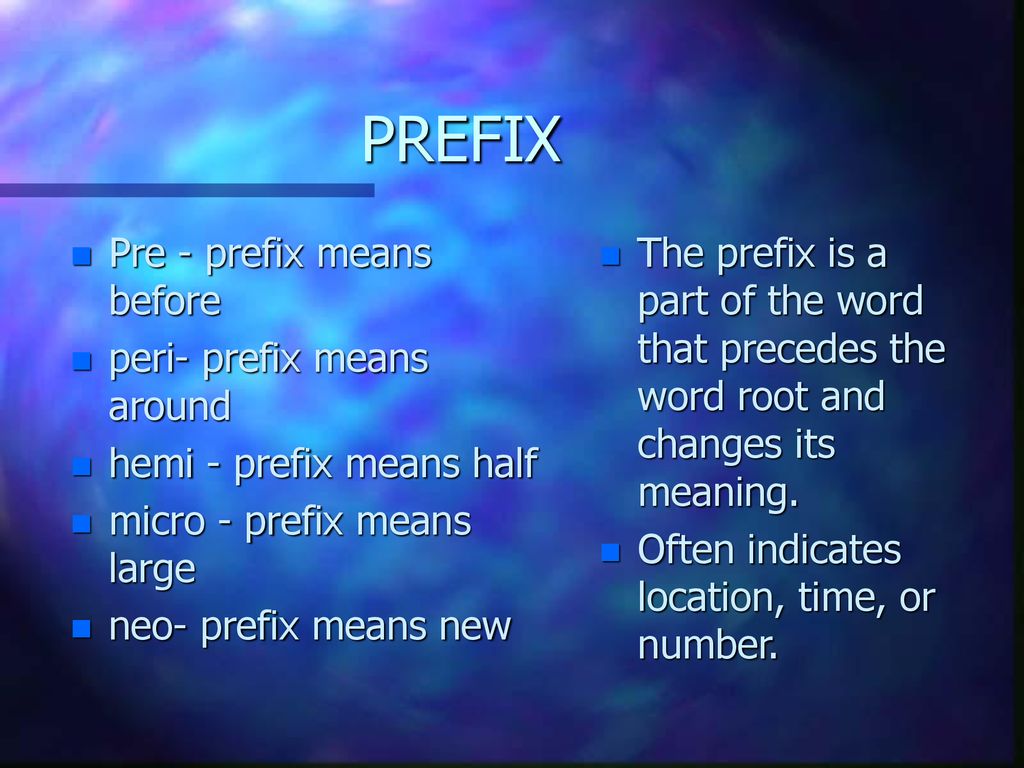Imagine opening a dusty, old book, its pages whispering tales of a forgotten time. As you turn the brittle pages, a word catches your eye. You recognize the root word, but it’s adorned with a strange, unfamiliar prefix. This prefix, like a key, unlocks a hidden meaning, revealing a new dimension to the word’s definition. This is the power of prefixes: they transform words, injecting new meaning and often altering the word’s class entirely.

Image: prowritingaid.com
In the vast ocean of language, prefixes are like tiny, powerful currents, shaping the course of words and enriching our vocabulary. From the humble “un-” to the complex “ante-“, prefixes add nuance, precision, and dynamism to our communication. Let’s dive deeper into this fascinating realm of linguistic exploration and unlock the secrets of prefixes.
Prefixes: A Gateway to New Meanings
Prefixes are word parts that are added to the beginning of a word. They usually have a specific meaning, which they then transfer to the word they attach to. A prefix may add a negative meaning, a sense of direction, or a specific position in time.
For instance, the prefix “un-” often signifies the opposite of the base word. “Happy” becomes “unhappy,” “tied” becomes “untied,” and “do” becomes “undo.” This simple prefix has the power to completely alter the meaning of the base word, giving us a nuanced way to express ourselves.
Decoding Prefixes: A Guide to Improved Vocabulary
Understanding prefixes is a valuable asset in vocabulary building. Imagine encountering a word you haven’t seen before. By recognizing the prefix, you can often deduce the word’s meaning. For example, if you encounter the word “prehistoric,” you might recognize the prefix “pre-“, which typically means “before.” This gives you a strong clue about the meaning of “prehistoric” – something that existed before history.
Understanding prefixes can also help you form new words and understand their meanings. For instance, knowing that the prefix “re-” means “again” or “back,” you can easily understand the meaning of “reconstruct” (to build again) or “re-read” (to read again). This intuitive understanding of prefixes makes it easier to expand your vocabulary and communicate effectively.
Beyond their utility in deciphering new words, prefixes add depth and precision to our language. They allow us to express subtle variations in meaning, nuance, and context. For instance, compared to “happy,” “unhappy” conveys a specific shade of discontent, while “discontent” indicates a deeper dissatisfaction. Similarly, “underpaid” suggests a level of injustice compared to simply being “paid less.”
These subtle variations in meaning, enabled by prefixes, enrich our communication and allow for more precise and nuanced expressions. Mastering prefixes allows you to express yourself with greater clarity and sophistication, enhancing the richness and depth of your vocabulary.
The Evolution of Prefixes: From Ancient Roots to Modern Usage
The roots of prefixes are entwined with the history of language itself. Many prefixes originate from ancient Greek and Latin, reflecting the influence of these languages on European languages. As languages evolved, so did the usage of prefixes, expanding their scope and introducing new shades of meaning.
Modern English, with its diverse linguistic heritage, embraces prefixes from various sources, including Old English and other Germanic languages. This has led to a fascinating blend of prefixes, each contributing to the unique richness of our vocabulary.
Moreover, prefixes are not static entities. They evolve alongside the language, acquiring new meanings and reflecting changing cultural and social trends. The prefix “cyber-“, for instance, emerged in the digital age, signifying the rapid evolution of technology and its impact on our lives. This dynamic nature of prefixes makes language a living, breathing entity, constantly adapting and responding to the world around us.

Image: slideplayer.com
Prefixes in the Digital Age: Enhancing Our Online Communication
In the digital age, prefixes play a crucial role in shaping online communication. From hashtags to acronyms, prefixes contribute to the speed and efficiency of online information exchange. Hashtags, often prefixed with a “#”, provide quick and direct access to related content and discussions.
Acronyms, such as “OMG” and “LOL,” use a combination of letters, often prefixed with a “C,” to convey emotions and sentiments in a concise and efficient manner. These digital prefixes have become an integral part of online communication, reflecting the ever-evolving landscape of our digital lives.
Tips for Mastering Prefixes: Unleash the Power of Your Vocabulary
Embarking on a journey to master prefixes is like unlocking a treasure chest of knowledge. Here are some tips to help you navigate this exciting linguistic landscape:
- Become a Prefix Detective: Start by creating a list of common prefixes and their meanings.
Refer to dictionaries, online resources, and language textbooks to build your understanding. - Practice Makes Perfect: Incorporate your newfound prefix knowledge into your daily vocabulary.
Try using prefixed words in your writing, conversations, and social media interactions. - Embrace the Power of Context: Context plays a crucial role in understanding the meaning of a prefixed word.
Pay attention to the surrounding words and sentences to gain a deeper understanding of the word’s nuanced meaning.
Frequently Asked Questions (FAQs)
1. What are some common prefixes used in English?
Some common prefixes used in English include: “un-“, “re-“, “pre-“, “dis-“, “in-“, “mis-“, “anti-“, “pro-“, “sub-“, “super-“, “inter-“, “intra-“, “trans-“, “bi-“, “tri-“, and “multi-“.
2. How can I tell which prefix to use in a specific situation?
It’s helpful to consider the context of the sentence, the intended meaning, and the overall tone. Dictionaries, grammar guides, and online resources can also help you choose the appropriate prefix for specific words and situations.
3. Can prefixes change the part of speech of a word?
Yes, prefixes can influence the part of speech of a word. For example, the prefix “un-” can transform a noun into an adjective (like “happy” to “unhappy”) or a verb into an adjective (like “do” to “undo”).
Prefix Means New
Conclusion
Prefixes are the building blocks of words, forming a fascinating foundation for our vocabulary. They unlock new meanings, add depth to our communication, and enhance our understanding of the nuances of language. As you continue to explore the world of prefixes, you will discover a newfound appreciation for the richness and complexity of the English language.
Are you interested in learning more about prefixes? Do you have any favorite prefixes or words with prefixes that you find particularly interesting? Share your thoughts in the comments below!





